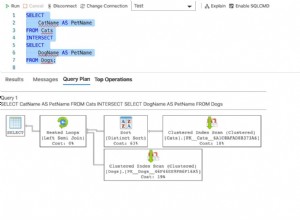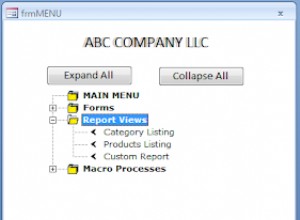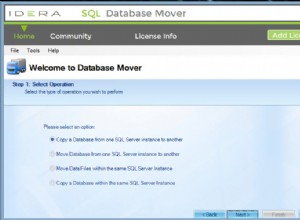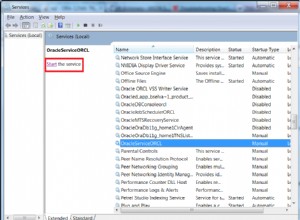Jika Anda tertarik, berikut adalah beberapa cuplikan kode untuk mendapatkan tipe pengguna khusus Hibernate. Pertama-tama perluas dialek PostgreSQL untuk memberitahukannya tentang tipe json, terima kasih kepada Craig Ringer untuk penunjuk JAVA_OBJECT:
import org.hibernate.dialect.PostgreSQL9Dialect;
import java.sql.Types;
/**
* Wrap default PostgreSQL9Dialect with 'json' type.
*
* @author timfulmer
*/
public class JsonPostgreSQLDialect extends PostgreSQL9Dialect {
public JsonPostgreSQLDialect() {
super();
this.registerColumnType(Types.JAVA_OBJECT, "json");
}
}
Selanjutnya implementasikan org.hibernate.usertype.UserType. Implementasi di bawah ini memetakan nilai String ke tipe database json, dan sebaliknya. Ingat String tidak dapat diubah di Java. Implementasi yang lebih kompleks dapat digunakan untuk memetakan kacang Java kustom ke JSON yang disimpan dalam database juga.
package foo;
import org.hibernate.HibernateException;
import org.hibernate.engine.spi.SessionImplementor;
import org.hibernate.usertype.UserType;
import java.io.Serializable;
import java.sql.PreparedStatement;
import java.sql.ResultSet;
import java.sql.SQLException;
import java.sql.Types;
/**
* @author timfulmer
*/
public class StringJsonUserType implements UserType {
/**
* Return the SQL type codes for the columns mapped by this type. The
* codes are defined on <tt>java.sql.Types</tt>.
*
* @return int[] the typecodes
* @see java.sql.Types
*/
@Override
public int[] sqlTypes() {
return new int[] { Types.JAVA_OBJECT};
}
/**
* The class returned by <tt>nullSafeGet()</tt>.
*
* @return Class
*/
@Override
public Class returnedClass() {
return String.class;
}
/**
* Compare two instances of the class mapped by this type for persistence "equality".
* Equality of the persistent state.
*
* @param x
* @param y
* @return boolean
*/
@Override
public boolean equals(Object x, Object y) throws HibernateException {
if( x== null){
return y== null;
}
return x.equals( y);
}
/**
* Get a hashcode for the instance, consistent with persistence "equality"
*/
@Override
public int hashCode(Object x) throws HibernateException {
return x.hashCode();
}
/**
* Retrieve an instance of the mapped class from a JDBC resultset. Implementors
* should handle possibility of null values.
*
* @param rs a JDBC result set
* @param names the column names
* @param session
* @param owner the containing entity @return Object
* @throws org.hibernate.HibernateException
*
* @throws java.sql.SQLException
*/
@Override
public Object nullSafeGet(ResultSet rs, String[] names, SessionImplementor session, Object owner) throws HibernateException, SQLException {
if(rs.getString(names[0]) == null){
return null;
}
return rs.getString(names[0]);
}
/**
* Write an instance of the mapped class to a prepared statement. Implementors
* should handle possibility of null values. A multi-column type should be written
* to parameters starting from <tt>index</tt>.
*
* @param st a JDBC prepared statement
* @param value the object to write
* @param index statement parameter index
* @param session
* @throws org.hibernate.HibernateException
*
* @throws java.sql.SQLException
*/
@Override
public void nullSafeSet(PreparedStatement st, Object value, int index, SessionImplementor session) throws HibernateException, SQLException {
if (value == null) {
st.setNull(index, Types.OTHER);
return;
}
st.setObject(index, value, Types.OTHER);
}
/**
* Return a deep copy of the persistent state, stopping at entities and at
* collections. It is not necessary to copy immutable objects, or null
* values, in which case it is safe to simply return the argument.
*
* @param value the object to be cloned, which may be null
* @return Object a copy
*/
@Override
public Object deepCopy(Object value) throws HibernateException {
return value;
}
/**
* Are objects of this type mutable?
*
* @return boolean
*/
@Override
public boolean isMutable() {
return true;
}
/**
* Transform the object into its cacheable representation. At the very least this
* method should perform a deep copy if the type is mutable. That may not be enough
* for some implementations, however; for example, associations must be cached as
* identifier values. (optional operation)
*
* @param value the object to be cached
* @return a cachable representation of the object
* @throws org.hibernate.HibernateException
*
*/
@Override
public Serializable disassemble(Object value) throws HibernateException {
return (String)this.deepCopy( value);
}
/**
* Reconstruct an object from the cacheable representation. At the very least this
* method should perform a deep copy if the type is mutable. (optional operation)
*
* @param cached the object to be cached
* @param owner the owner of the cached object
* @return a reconstructed object from the cachable representation
* @throws org.hibernate.HibernateException
*
*/
@Override
public Object assemble(Serializable cached, Object owner) throws HibernateException {
return this.deepCopy( cached);
}
/**
* During merge, replace the existing (target) value in the entity we are merging to
* with a new (original) value from the detached entity we are merging. For immutable
* objects, or null values, it is safe to simply return the first parameter. For
* mutable objects, it is safe to return a copy of the first parameter. For objects
* with component values, it might make sense to recursively replace component values.
*
* @param original the value from the detached entity being merged
* @param target the value in the managed entity
* @return the value to be merged
*/
@Override
public Object replace(Object original, Object target, Object owner) throws HibernateException {
return original;
}
}
Sekarang yang tersisa hanyalah membubuhi keterangan entitas. Letakkan sesuatu seperti ini di deklarasi kelas entitas:
@TypeDefs( {@TypeDef( name= "StringJsonObject", typeClass = StringJsonUserType.class)})
Kemudian beri anotasi pada properti:
@Type(type = "StringJsonObject")
public String getBar() {
return bar;
}
Hibernate akan menangani pembuatan kolom dengan tipe json untuk Anda, dan menangani pemetaan bolak-balik. Masukkan pustaka tambahan ke dalam implementasi tipe pengguna untuk pemetaan lebih lanjut.
Berikut ini contoh proyek GitHub cepat jika ada yang ingin bermain-main dengannya:
https://github.com/timfulmer/hibernate-postgres-jsontype




